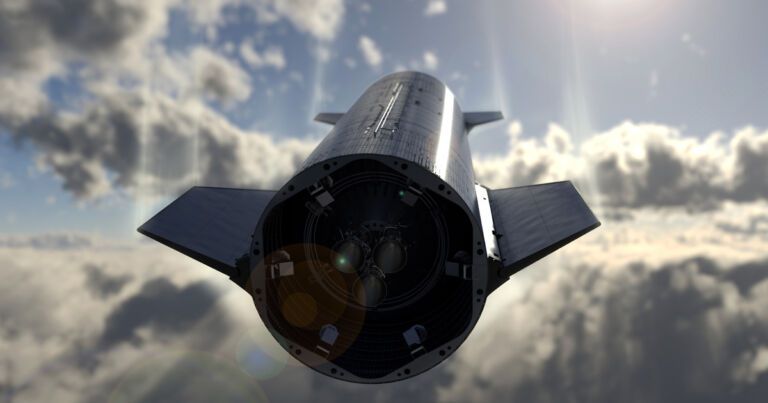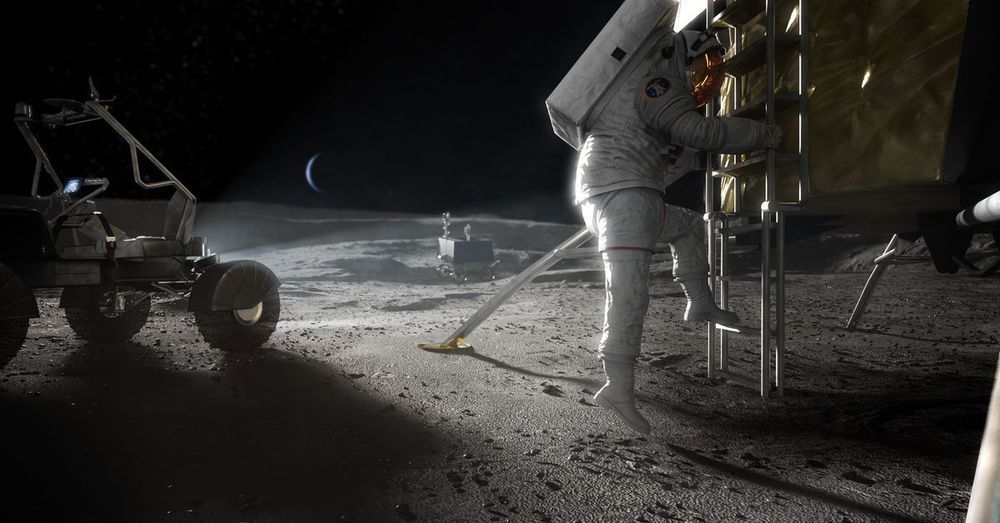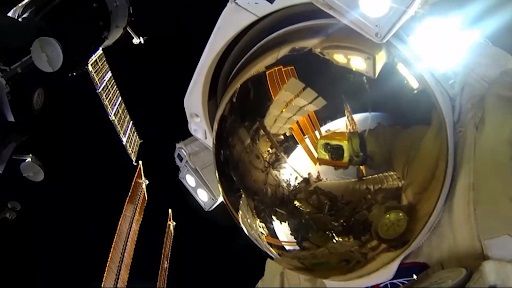“Will be less roomy with 3 vacuum rocket engines added.”



And more countries could be signing soon.
NASA released the draft of the accords to other space-faring countries, and after getting their input, the agency came up with the final document, which includes standards for things like lunar mining and how to handle conflicts on the Moon’s surface. NASA Administrator Jim Bridenstine says the main goal is to get everyone on the same page about lunar exploration and head off any future international misunderstandings or conflicts. “When we think about the Artemis Accords, what we’re trying to do is establish norms of behavior that every nation can agree to,” Bridenstine said during a press call ahead of the announcement.
The seven nations that have signed along with the US are: Australia, Canada, Japan, Luxembourg, Italy, the United Kingdom, and the United Arab Emirates. NASA says that it has also spoken with other countries interested in signing, but these seven nations were able to go through the interagency process the fastest. That means more countries could be signing on to the accords very soon — even before the end of the year, according to NASA. “This first announcement is very much a beginning, not an ending to the nations joining the Accords,” Mike Gold, NASA’s acting associate administrator for the office of international and interagency relations, said during the briefing.

Partnership will use diagnostic imaging tools to explore health issues associated with microgravity, and apply this knowledge to patients on Earth.
The French Society of Radiology (SFR) and the country’s national centre for space exploration (CNES) have signed a partnership, details of which were streamed live at the Journées Francophones de Radiologie (JFR) congress on 4 October. The aim is to develop imaging solutions to be sent on space flights and to collaborate on image collection and optimization, teleradiology and training of astronauts.
France has the largest space program in Europe and the third oldest institutional space programme in history, along with Russia and the US. CNES, which has a long track record in space exploration, recognizes the great potential of diagnostic imaging for monitoring astronauts’ health while on missions, according to general director Lionel Suchet.
The plan is to create a “two-way street” in which radiologists and space experts will collaborate on innovative projects to make further progress, JFR delegates heard online at the plenary Antoine Béclère lecture. A SFR–CNES working group will now define the research themes and establish a schedule of tasks ahead by December.


Elon Musk is among the few people on Earth that are working towards changing the course of humanity’s future in a drastic way. He founded SpaceX in 2002 to make life multiplanetary –colonize Mars. Since then, SpaceX has developed some of the world’s most advanced rockets and spacecraft. Throughout the years Musk’s bold ideas, ambitious goals, and ability to lead teams to achieve greatness has earned him a place in history. Hollywood actor Channing Tatum seems to be inspired by Musk’s space venture that he is now planning to produce an HBO drama television series about Musk and his journey at SpaceX.
According to Deadline reporters, who first reported the news, Tatum’s film production company, Free Association, will produce a six-episode scripted series. The story will be about how SpaceX started with a rocket that almost did not make it to orbit, to returning human spaceflight capabilites to the United States. “The project will be penned by Star Trek Beyond scribe Doug Jung based on Ashlee Vance’s book Elon Musk: Tesla, SpaceX, and the Quest for a Fantastic Future, first published in 2017,” Deadline reports, “Free Association’s Tatum, Reid Carolin and Peter Kiernan will executive produce with Vance and Len Amato, HBO’s former President Of HBO Films, Miniseries & Cinemax.”
This will be the 13th New Shepard mission and the 7th consecutive flight for this particular vehicle (a record), demonstrating its operational reusability. N…
Blue Origin successfully completed the 13th New Shepard mission on October 13, 2020. New Shepard flew 12 commercial payloads to space on this mission, including the Deorbit, Descent, and Landing Sensor Demonstration with NASA’s Space Technology Mission Directorate under a Tipping Point partnership. This was the first payload to fly mounted on the exterior of a New Shepard booster rather than inside the capsule, opening the door to a wide range of future high-altitude sensing, sampling, and exposure payloads.
Also on board were tens of thousands of postcards from students around the world from Blue Origin’s nonprofit, Club for the Future, some of which will include a special NASA Artemis stamp.
With this successful mission, New Shepard has flown more than 100 payloads to space across 10 sequential flights. All mission crew supporting this launch exercised strict social distancing and safety measures to mitigate COVID-19 risks to personnel, customers, and surrounding communities. Learn more about this mission and the payloads flown on New Shepard on BlueOrigin.com: https://bit.ly/367AcM3.

The mission was previously scheduled for 2:40 a.m. ET on October 31. The latest delay allows SpaceX to evaluate an issue with its Falcon 9 rocket engines during a recent test launch. The rocket’s gas generators demonstrated abnormal behavior, NASA said in a statement, though it didn’t specify what went wrong.
SpaceX aborted a scheduled launch of its Falcon 9 rocket on October 2 after a gas generator saw an unexpected rise in pressure.
This isn’t the first time SpaceX has delayed Crew-1, the company’s first official, contracted astronaut mission for NASA. The mission was originally slated to launch as early as September. It was pushed back until Halloween to better coordinate with the schedules of other cosmonauts and astronauts going to and from the ISS.

Circa 2018
In the 2015 movie “The Martian,” astronaut Mark Watney survives on Mars by growing potato plants in his own waste. The scenario is fictional, of course, but it underscores a real-world challenge for NASA: How can the space agency ensure an uninterrupted supply of safe, nutritious food for astronauts who are tens of millions of miles from the nearest supermarket?
The successful launch of SpaceX’s Falcon Heavy rocket marked a big step toward developing the technology needed to transport colonists to Mars, though the strategy for keeping them and deep-space astronauts fed remains a work in progress.
At Pennsylvania State University, researchers think they’ve hit upon a solution. They’ve devised a compact recycling system that uses astronaut poop and pee to fuel the growth of edible bacteria. As described in a paper published in November 2017 in Life Sciences in Space Research, the bioreactor breaks down human waste into salts and methane gas; the latter is used to fuel the growth of a protein-rich “microbial goo” that’s similar in consistency to Vegemite.

This week, NASA’s Planetary Science Division (PSD) hosted a community workshop at their headquarters in Washington, DC. Known as the “Planetary Science Vision 2050 Workshop”, this event ran from February 27th to March 1st, and saw scientists and researchers from all over the world descend on the capitol to attend panel discussions, presentations, and talks about the future of space exploration.
One of the more intriguing presentations took place on Wednesday, March 1st, where the exploration of Mars by human astronauts was discussed. In the course of the talk, which was titled “A Future Mars Environment for Science and Exploration”, Director Jim Green discussed how deploying a magnetic shield could enhance Mars’ atmosphere and facilitate crewed missions there in the future.
The current scientific consensus is that, like Earth, Mars once had a magnetic field that protected its atmosphere. Roughly 4.2 billion years ago, this planet’s magnetic field suddenly disappeared, which caused Mars’ atmosphere to slowly be lost to space. Over the course of the next 500 million years, Mars went from being a warmer, wetter environment to the cold, uninhabitable place we know today.

The United States military has teamed up with Elon Musk and the company he heads, SpaceX. The goal of the tie-up is to build a rocket capable of delivering weapons anywhere on the globe in an hour. The benefits of quickly delivering weapons and other cargo anywhere on the planet very quickly are readily apparent.
The rocket would travel at 7500 miles per hour and would be able to carry 80 metric tons of cargo into orbit. The rocket could then land anywhere on the planet. The contract will see SpaceX begin by assessing costs and technical challenges for the project. Gen. Stephen Lyons, the head of US Transportation Command, said on Wednesday that initial tests are expected to begin in 2021.
What the military and SpaceX are trying to do is incredible. Using rockets to deliver massive payloads would allow the 7652 mile trip from Florida to Afghanistan could be completed within an hour. To compare, a C-17 Globemaster transport aircraft has a maximum speed of 590 mph and would require 15 hours to make the same journey.